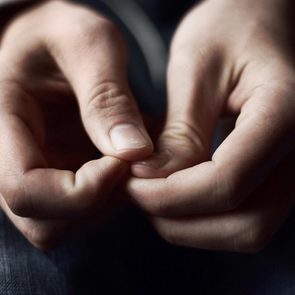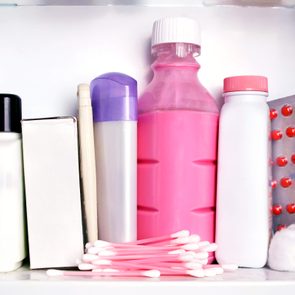Obsessed with The Home Edit? Why It Feels So Good to Get Organized
Updated: Apr. 01, 2021
Yes, there are health benefits of getting organized. Here's what mental health experts think about this trend, and why people love to get organized with systems like The Home Edit.
Our editors and experts handpick every product we feature. We may earn a commission from your purchases.
Trying to get organized? It’s a trend
The home has become so much more than a place to eat and sleep. In 2020, it turned into a schoolroom, an office space, a restaurant—you name it.
So it makes sense that with all the extra time spent at home this year, more people are organizing and decluttering.
Enter The Home Edit, a home organization service that inspired a best-selling organization book and a Netflix show. The founders, organizational gurus Clea Shearer and Joanna Teplin, have become as popular as organizing expert Marie Kondo.
Their following is proof that, in today’s uncertain world, there’s something oddly comforting about a drawer of perfectly folded clothes.
So why does organizing and decluttering feel so good? We talked to mental health experts about the power of organizing and the benefits of less clutter.
Why organizing and decluttering is so popular during the pandemic
The drive for more organization during the pandemic is related to two factors, according to therapist Heather Lyons, PhD, licensed psychologist and professor of psychology at Loyola University in Baltimore.
“First, our homes now need to serve multiple purposes,” she says. “Our dining rooms are also offices, and children’s bedrooms serve as schools.”
A little organization can go a long way when it comes time to using one room in many ways. (Here’s how wellness experts are dealing with coronavirus stress.)
Working in a disorganized space has its disadvantages. In a trial published in a 2014 issue of the Journal of Affective Disorders, researchers found that people with clutter have a harder time processing information and have difficulty making decisions.
Another reason for the popularity of organizing is that Zoom has opened up our homes to other people. “In meeting after meeting on Zoom, we’re exposing our living spaces to friends and workmates,” Lyons says. “Before the pandemic, we might have allowed others to see in through our front doors without preparation.”
Now, on a daily basis, others can see rooms that were previously private spaces. “Our homes now need to represent us as professionals,” she adds. “That’s made us aware and self-conscious in ways we never thought about before.”
Of course, there’s also the fact that so many of us are at home now that we finally have to address the mess that we see every day, says Charleen Lewis, a social worker at The Ohio State University Wexner Medical Center.
OK, but why does it feel so good?
Taking on clutter is a safe way to gain some control during a time where Covid-19 restrictions mean limited control over so much of life, Lewis says. “Seeing our world in some pattern or order seems innately more quieting of the mind, especially for those who are visually stimulated and distracted,” she says.
Organizing has always served to help reduce stress—and it’s heightened in the pandemic, adds Lyons. “We’re living in a time of great uncertainty, forcing us to recognize the limits of our control.” Organizing is a good antidote to that, providing an immediately satisfying sense of control.
“Perhaps we can’t predict our place in line for the vaccine,” Lyons says. “However, we can reduce a stack of papers in our shredder or find the perfect home for our paper clips.” In fact, one of the best ways to conquer worry is to clear out the clutter.

Your physical space is connected to your mental health
Anything in our visual field affects our brain and how we’re processing information and interacting with the world, according to psychologist Jaclyn Lopez Witmer, co-founder of WithTherapy. So yes, your physical space impacts your well-being. Research in a 2019 issue of the journal Building and Environment also found that physical environments influence our emotions and behaviors. (Here’s how decluttering helped this woman cure her insomnia.)
“I once had a tennis coach who would always say, ‘Clear the court to clear your mind!’ That can be true when it comes to the physical space we’re existing in, too,” Witmer says. “Of course, everyone has different tolerance levels when it comes to clutter and space. So that should also be taken into account in terms of impact on mental health.” For the most part, being surrounded by clutter is an everyday thing that could trigger anxiety.
In an analysis of 60 spouses in the journal Personality and Social Psychology Bulletin, married women with cluttered homes had higher levels of the stress hormone cortisol. The same research suggests that people who describe their homes as cluttered see an increase in depressed mood throughout the day. On the flip side, a study in the Journal of Neuroscience found that people without clutter in their environment had better focus, were more productive and less irritable, too.
Why do some people have a harder time than others with organizing?
Organization can be difficult for a few reasons. “Some people have a difficult time finding the signal in the noise,” Lyons says. “When people have a hard time with this, they have a hard time purging because every item can feel valuable.” In their mind, every item has a purpose. The problem is that when you save everything, you can find nothing. “When people assign a sentimental value to many objects, it can be hard to let go,” adds Lyons.
Still, others simply have a higher tolerance for clutter. “Research suggests that this difference can be broken down by gender,” Lyons says. “Women are more likely to experience anxiety in cluttered environments, whereas men find it easier to walk by a pile of laundry or a cluttered countertop.” (Although this is likely due to cultural expectations and traditional gender roles in that past that make women more responsible for things like clean laundry and clear countertops.)
Other reasons some people have difficulty with organizing are complex. For example, in general, people with ADHD are easily distracted and have trouble staying focused to complete a task.
“By the end of the day, they may leave a trail of their activities with clear clues of their projects still in view,” says Lewis. Eventually, this becomes clutter. And many feel so discouraged they don’t know how to begin to sort out the mess. (Check out these easy household things you can declutter every day.)
By the end of the day, the exhaustion from working at home, tutoring their children, and having no escape from the stress may mean organizing isn’t top of mind.
Could the drive to organize go too far?
Extremes of any kind can have downsides. The drive to organize is problematic if it starts to cause distress.
“For instance, sometimes someone who has been diagnosed with OCD or has obsessive-compulsive tendencies related to cleaning and organization may have a particularly difficult time with living and working from home because they constantly see chores and cleaning to do,” Witmer says. “When that drive to clean and organize becomes excessive, it causes a lot of anxiety and internal stress and may affect other areas of the person’s life.”
Note that now everyone with a diagnosis of OCD has symptoms that manifest in cleaning.
The drive to organize becomes personally destructive when the priority to organize persistently overrides more important tasks, or when something out of place becomes intolerable, Lewis adds. “When couples have very different levels of tolerance or comfort levels of the organization of their living space, this often becomes a daily tension and a gridlocked issue,” she says.
How to get organized for better mental health
If starting to organize everything in your house seems overwhelming, Witmer recommends easing into the process. “Take a look around your space and gently notice a spot or two that could use some decluttering and organizing,” she says.
Maybe it’s your desk area, a pantry shelf, a miscellaneous kitchen drawer, or your coffee table. “Getting rid of a few things here or there and changing up your space a bit can go a long way for your comfort level and improved well-being,” Witmer says.
You don’t need to do all the organizing and decluttering in one day. “If you dread decluttering and organizing, try to reframe it for yourself as a form of self-care and improving your mental health during these challenging times,” Witmer says. (Here’s how to organize your medicine cabinet in 7 easy steps.)
If you’re thinking of adding something to your space, see if there’s something else that could go. Maybe there are items you’re not using that someone else could use. Consider donating those.
Using visible checklists and planning for organizing days as a family, when everyone takes responsibility for cleaning up their stuff, is a good option, says Lewis.
“I have had several patients feel very good about having an organizing expert come into their home to help them get started when they become so overwhelmed they have no initiative to begin,” she says. Maybe start with getting rid of the things you should never keep in your bedroom.














